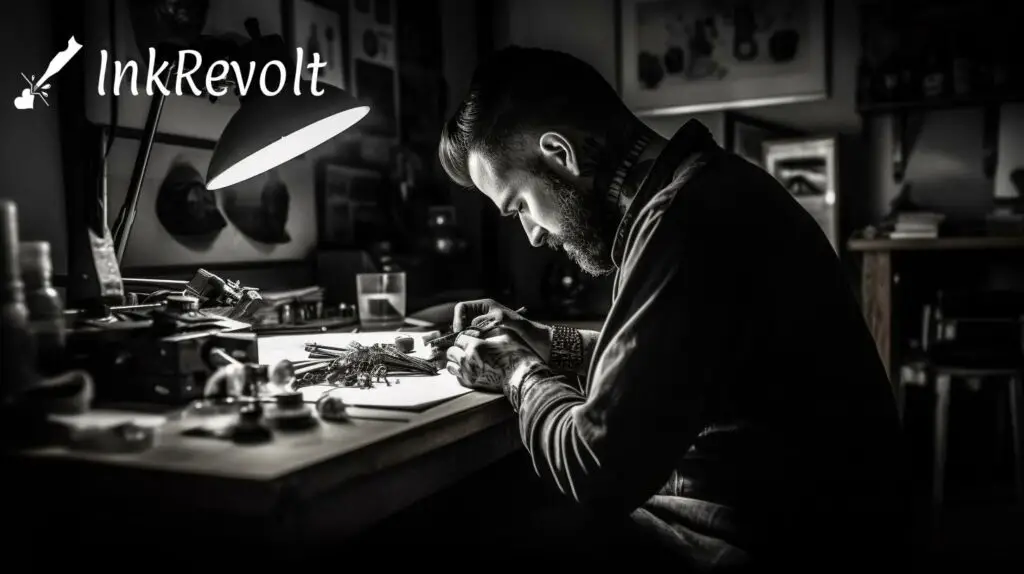Can You Be A Self-Taught Tattoo Artist?
While tattoo apprenticeships have been the norm for decades, it is now feasible to become a tattoo artist without ever having worked under a mentor. So, can you be a self-taught tattoo artist? If yes, what are the ways?
Yes, it is possible to become a self-taught tattoo artist, but it takes a lot of dedication and hard work. Study tattooing essentials, including tools, skin anatomy, and styles and procedures. Practising yourself or willing friends and family is an excellent start, but tattoos are permanent and errors are hard to fix. Research local tattoo laws and follow them. Finally, professional tattoo artists can help you improve and find your style.
This article will provide useful tips and advice for any tattoo artist, whether they are just starting out or want to further their craft. If you want to become a tattoo artist through your own efforts, read on!

Can You Learn To Tattoo On Your Own?
It is feasible to teach yourself tattooing, but you should be prepared to put in a lot of time and effort. If you want to become a tattoo artist via your own efforts, consider the following suggestions.
Study up on the fundamentals of tattooing
Tattooing is a complicated art form that requires the use of specialized equipment to inject ink into the skin. To ensure the tattoo is placed and deep enough, knowledge of skin anatomy is essential.
It’s not only about keeping things clean that helps stop the spread of sickness and infection. Different hues and colours are created with the use of a tattoo machine, needles, and ink. While getting a tattoo, it’s crucial to take into account the client’s wishes and preferences in terms of design and placement. Aftercare is similarly important for a successful recovery and reduced risk of infection.
Practice on yourself or willing friends and family
You can get the hang of things and hone your talents by practising on yourself or on friends and relatives who are prepared to serve as guinea pigs.
Find out what rules and legislation are in effect in your area
Be aware of and abide by any laws that pertain to tattooing in your area. In California, tattoo artists are required to be licensed and follow strict safety and sanitation standards. The state also prohibits the tattooing of minors under the age of 18, even with parental consent.
In New York, tattoo artists must also be licensed and follow safety and sanitation guidelines. This state also prohibits the tattooing of minors under the age of 18 and yes, even with parental consent.
In Texas, tattoo artists are required to be licensed and follow safety and sanitation standards. The state also prohibits the tattooing of minors under the age of 18, unless they have parental consent and are accompanied by a parent or legal guardian during the tattooing process.
In Florida, tattoo artists are required to be licensed and follow safety and sanitation guidelines. The state also prohibits the tattooing of minors under the age of 16, even with parental consent.
It’s important to note that rules and legislation related to tattooing can vary by state, city, and even county. It’s important for tattoo artists and clients to be aware of the specific rules and regulations in their area to ensure safe and legal tattooing practices.
Get opinions from experienced tattooists
If you want to establish your own unique style as a tattoo artist, it might be beneficial to get critiques and pointers from seasoned professionals.
Keep in mind that tattoos are a type of permanent art, and it might be difficult to remove an unsatisfactory design if it is done incorrectly. It’s best to proceed with caution and care and get help from experts when you need it, since this is a potentially serious procedure.

How Do People Enter the Tattoo Industry?
A person may enter the tattoo business in a number of ways like below.
Traditional apprenticeship
One of the most typical and conventional routes into the tattoo business is to serve an apprenticeship under an established professional. Training as an apprentice may span from a few months to many years, and it often includes learning the fundamentals of tattooing via hands-on practice and observation.
Formal training program
Some educational establishments provide official training programs in tattooing, which may give students foundational knowledge of the art as well as practical experience.
Self-taught
As was previously noted, one may become a tattoo artist by studying the fundamentals, practising on oneself or willing friends and family, and receiving critique from more seasoned professionals.
Regardless of your chosen career route, you should be aware that tattooing is a highly regulated profession that requires adhering to local rules and regulations and honing your abilities through consistent practice and study.
To further guarantee the quality and safety of your tattoos, it is recommended that you choose a certified tattoo artist.

The Pros and Cons of Being Self-Taught
Some benefits and drawbacks of self-taught tattooing are as follows.
Pros:
- Self-study provides more leeway than traditional classroom instruction in terms of time and place of study.
- Self-taught tattoo artists are free to experiment with their craft since they are not bound by the standards of an established apprenticeship or school.
- Traditional apprenticeships and training programs may be costly, but self-study can provide significant savings.
Cons:
- The lack of a set curriculum makes it tough to learn the fundamentals of tattooing and know where to put most of your time and energy without the guidance of an experienced mentor.
- Self-taught tattoo artists may struggle to grow their talents and enhance their technique without the help and supervision of more seasoned tattoo artists.
- The potential for legal and safety issues arises because tattooing is a heavily regulated profession, and self-taught tattoo artists may not be familiar with or follow the rules in their area.
- Self-taught tattoo artists may have trouble attracting customers because they lack the legitimacy that comes with completing a formal apprenticeship or training program.
Before embarking on a career as a self-taught tattoo artist, it’s wise to conduct some research and get the opinion of experts.
Developing Your Skills And Finding Inspiration
Learning the craft and refining your abilities are priority number one if you want to start a career as a tattoo artist who taught themselves. To achieve this requires a great deal of effort, study, and trial and error.
You must continuously challenge yourself to experiment with new methods. The easiest way to learn which supplies work best for you is to try with them, study the work of established tattoo artists, and go to seminars and other related events. And don’t be shy about asking for input and direction. A new viewpoint might give you a new appreciation for your work and motivate you to attempt something else.
It is essential to the quest to find sources of motivation along the way. Nature, art, and life experience are just a few of the numerous places one might find inspiration. The trick is to maintain a flexible mindset and welcome fresh perspectives.
Go visit museums, explore other countries, and learn about other cultures. Your chances of being inspired to get a tattoo increase in proportion to the number and variety of life events you’ve had.
Learning how to tattoo on your own is a fascinating and artistic adventure. Working diligently, sticking with it, and being open to new ideas are all necessities.
However, if you take the appropriate approach and have a never-ending thirst for knowledge, you will be able to improve your talents and discover the inspiration you need to become a tattoo artist who is really one of a kind. So, dive in, and let your passion fly!

Common Challenges Faced By Self-taught Tattoo Artists
Starting out as a self-taught tattoo artist may be difficult for a variety of reasons. Among the most typical problems are:
1. Lack of experience
Self-taught tattoo artists may lack the hands-on experience and confidence necessary to become a great tattoo artist due to a lack of official training or apprenticeships.
2. Difficulty building a client base
For self-taught tattoo artists, gaining a clientele is sometimes difficult, especially in a crowded market. Here are a couple of suggestions on building a client base.
Showcase your work: Building a strong portfolio is essential for showcasing your skills and attracting potential clients. Take high-quality photos of your work and share them on social media and other platforms. Consider offering discounted rates or other incentives to clients who allow you to use their photos in your portfolio.
Offer competitive rates: When starting out, it’s important to offer competitive rates to attract clients. Research what other tattoo artists in your area are charging and set your rates accordingly. Consider offering discounts for referrals or for clients who book multiple sessions.
Focus on quality and safety: Since you’re self-taught, it’s important to prioritize quality and safety in your work. Make sure to follow proper sterilization and hygiene protocols, use high-quality equipment and supplies, and take the time to ensure each tattoo is done properly.
Word of mouth can be a powerful marketing tool, and satisfied clients are more likely to recommend you to others.

3. Difficulty establishing credibility
Establishing credibility is crucial for any business or professional, and it can be especially challenging for those who are just starting out. A few ideas for addressing this problem are as follows.
Build a strong portfolio
Having a strong portfolio of your work is essential for showcasing your skills and establishing credibility. Include high-quality images of your greatest work, and think about rewarding clients who give you permission to publish their images by giving them a discount or other perk. Always keep your portfolio up-to-date to highlight your most current work and any gains in skill.
Get certified
To prove your dedication to your field and boost your reputation, consider getting certified or finishing a training program. One option is to complete a tattoo apprenticeship, another is to get certified by a recognized body, and still another is to attend workshops and conferences geared at professionals in the field.
Ask for testimonials
Ask satisfied clients to provide testimonials or reviews of your work. Use these reviews to help sell your product, and consider rewarding customers who provide them by showcasing them on your website or social media.
Network with other professionals
Networking with other tattoo artists, industry experts, and professionals in related fields can help establish your credibility and provide opportunities for collaboration and learning. Join relevant professional groups, start discussions in online forums, and join relevant social media groups to network with other professionals and boost your reputation.
4. Lack of access to resources
Lack of access to resources can be a significant challenge for anyone trying to start or grow a tattooing business. Here are a few suggestions that may be helpful:
Seek out online resources
The internet can be an invaluable source of information and resources, even if you don’t have access to in-person training or workshops. Look for online tutorials, blogs, forums, and video tutorials to learn new techniques, stay up to date on industry trends, and connect with other professionals.
Join online communities
Social media groups and forums can provide a platform to connect with other tattoo artists, industry experts, and enthusiasts. Participate in discussions, ask questions, and share your work to receive feedback and learn from others.
Find a mentor
Consider reaching out to an experienced tattoo artist or industry professional to ask for guidance and advice. A mentor can provide valuable insights, answer your questions, and provide support and encouragement as you build your business.
Attend industry events
Attending industry events like conventions, workshops, and trade shows can provide opportunities to network with other professionals, learn new techniques and skills, and gain exposure for your business. Look for local and regional events that are accessible to you.
Focus on the basics
Even if you don’t have access to the latest equipment or high-end supplies, you can still provide quality tattooing services by focusing on the basics. Prioritize safety and hygiene, use high-quality materials that are accessible to you, and focus on developing your technique and skills.

5. Legal and regulatory hurdles
Self-taught tattoo artists may find it difficult to comply with health and safety laws, as well as to get the appropriate licenses and permissions, since tattooing is a highly regulated business. Here are some suggestions for you to follow:
- Research local regulations
- Obtain necessary licenses and certifications
- Prioritize safety and hygiene
- Keep up with regulatory changes
- Consult with legal and regulatory experts.
While it’s true that many self-taught tattoo artists fail at first, many others succeed and make a living doing what they love. Self-taught tattoo artists may succeed in the field with dedication, practice, and a thirst for knowledge.
Understand the Sanitation Practices
Tattoo artists who have taught themselves the craft must take special care to learn and implement proper sanitation procedures. Some important features of clean sanitation systems are:
- In order to reduce the spread of disease, it is essential that all equipment be cleaned and disinfected after each use. Needles and associated accessories including grips, tips, tubes, and machines are included in this category.
- Tattoo artists should use a barrier lotion to prevent their skin from being damaged by the ink and should wash their hands properly before and after each tattoo.
- When getting a tattoo, it’s important to take precautions against the spread of infection by always wearing gloves.
- The danger of infection may be reduced by thoroughly cleaning and disinfecting the workspace after each client.
- Needles and other sharp objects should be disposed of in a safe manner to prevent accidental damage to others.
Frequently Asked Questions
What are some of the key skills that self-taught tattoo artists need to develop?
Tattoo artists who want to teach themselves must master not only the art of tattooing, but also the technical aspects of tattoo equipment, such as sterilization and sanitation procedures and tattoo design. Self-taught artists also need to be able to handle deadline pressure, organize their time wisely, and develop a clientele.
What resources are available to self-taught tattoo artists?
People interested in learning how to create tattoos on their own may do so by consulting a number of different online and offline resources, such as discussion boards, video guides, and workshops. And many self-taught painters find that networking with other local artists and visiting industry conferences helps them keep up with the latest trends and methods.
What are some of the common challenges faced by self-taught tattoo artists?
Self-taught tattoo artists often encounter obstacles such as a lack of experience, a lack of clients, a lack of credibility, a lack of funding, and legal and regulatory impediments. Self-taught tattoo artists have challenges similar to those faced by any other profession, but with dedication, hard effort, and a desire to growth, they may succeed despite these odds.
Last Thoughts
Tattoo artists who train themselves must master not only the technical aspects of using tattoo equipment, but also sketching and design, sterilization and hygienic techniques, and more.
Self-taught tattoo artists have unique hurdles, but the financial, artistic, and personal benefits of a successful business are well worth the effort. Last but not least, whether you learn the art formally or on your own, a commitment to quality and ongoing learning and development is the key to success in the tattoo industry.
